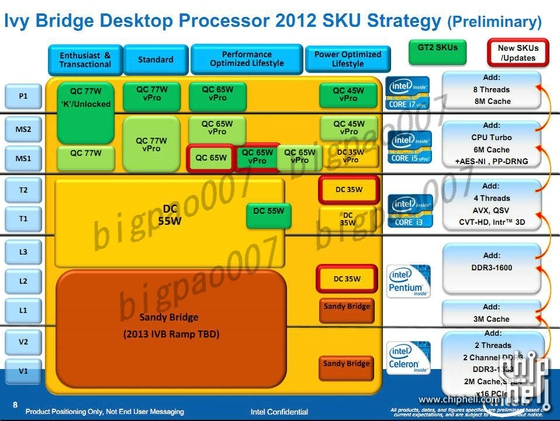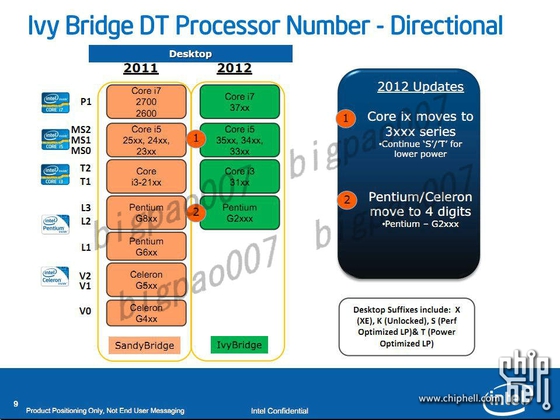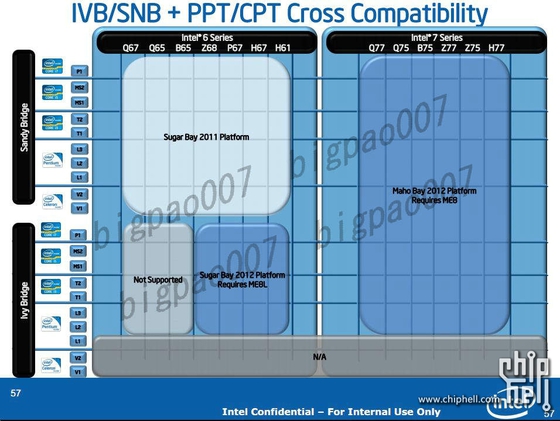Ivy Bridge to Have a Maximum TDP of 77 Watts
Based on information leaked from Chiphell, the new Ivy Bridge processors will have a maximum of 77 watts TDP (thermal design power), which is down from 95 watts for the current Sandy Bridge.
VR-Zone has provided what looks to be leaked roadmaps for the upcoming Ivy Bridge processors for 2012. The information is coming out of a Chinese forum (Chiphell), so the information can be taken as such, until official word from Intel. Based on the information provided, the new Ivy Bridge processors look to a have a peak TDP (thermal design power) of 77W for their extreme processors. The Ivy Bridge TDP looks to range from 77W down to 35W on their "power optimized" CPUs.
The roadmap shows a complex diagram on Intel's plans for late Q1/early Q2 2012. The information on the left looks to be information on Intel's marketing segmentations for each processor. The map shows there will be the standard unlocked K SKU's, just like with current gen Sandy Bridge processors. Intel's shrink to 22nm, alongside with its new "3D transistors", looks to be helping push down the TDP on the new Ivy Bridge processors. The quad core 65W S and 45W T SKU's are similar to what we are seeing on current Sandy Bridge CPUs. The new Pentium Ivy Bridge SKU's gain DDR3 1600MHz memory support, along with the rest of the Ivy Bridge chips.
There doesn't seem to be much of a format change for the upcoming Ivy Bridge CPUs and their name format. The higher-end CPUs will start with the i7 tag with unlocked versions followed by a "K" and lower power models followed by "S/I". Medium range CPUs will start with the i5 tag and the lower ranges will have the usual i3 tag. The CPUs will start with Core i7 37xx, Core i5 35xx, 34xx and 33xx, Core i3 31xx. The Pentiums and Celerons are expected to get a fourth digit in front which will be a 2, so they will be Pentium G2xxx.
Intel looks to be taking a page from AMD on making the Ivy Bridge CPU scompatible with current gen Sandy Bridge platforms (though there are things to watch for). The easiest method is to go with the newer 7-series chipsets, which will support current gen Sandy Bridge and Ivy Bridge CPUs, according to Intel. If you are wanting to use your current motherboard, things get a little more difficult for the end-user. Bad news first, the Q67, Q65 and B65 chipsets will not support Ivy Bridge even with a motherboard firmware update. The Z68, P67, H67 and H61 chipsets look to all be compatible with a required UEFI update (this can be seen by recent announcements of motherboard makers coming out the PCIe Gen 3 support, which require the Ivy Bridge CPU). This will require a flash to Intel's ME8L (L for Legacy) UEFI code to provide support for Ivy Bridge on the motherboards (VR-Zone hints that the ME8L may not be available for updating at initial launch of Ivy Bridge).
Get Tom's Hardware's best news and in-depth reviews, straight to your inbox.
-
makaveli316 "The Z68, P67, H67 and H61 chipsets look to all be compatible with a required UEFI update"Reply
Where's the catch? -
jacobdrj Well that is disheartening: How can I use my CPU as a space heater this winter if intel keeps lowering their desktop TDPs?...Reply
Guess I have to get a new Dual GPU video card with a 1.5 KW PSU to make up the difference...
What a shame :( -
Zagen30 Mobo backwards compatibility? From Intel? I'm surprised. Yes, not everything's compatible, and there's catches with everything else, but when's the last time there was any backwards compatibility in an Intel product?Reply
The lower TDP is impressive. I wonder how much power IB will use. -
ben850 Stupid question: Is Ivy Bridge supposed to be an upgrade to Sandy Bridge? Or is it strictly for low-powered applications?Reply -
de5_Roy early info, but looks very promising. here's hoping intel doesn't pull a cougar point or a bulldozer(more unlikely).Reply
the leak doesn't seem to share much about ivb's igp which is rumored to be a big upgrade from hd3000.
configurable tdp is very welcome. will make those cpus even more power efficient.
i guess the backward compatibility is a result of intel putting less emphasis on desktop(still impressive) and more on laptop, ultrabooks, portables. -
amk-aka-Phantom ReplyThe Z68, P67, H67 and H61 chipsets look to all be compatible with a required UEFI update (this can be seen by recent announcements of motherboard makers coming out the PCIe Gen 3 support, which require the Ivy Bridge CPU).
IN YOUR FACE AMD! Who drops sockets all the time now, huh? And that max TDP... in your face as well! -
soccerdocks ben850Stupid question: Is Ivy Bridge supposed to be an upgrade to Sandy Bridge? Or is it strictly for low-powered applications?Reply
Its an update. It will be faster than sandy bridge. -
balister ben850Stupid question: Is Ivy Bridge supposed to be an upgrade to Sandy Bridge? Or is it strictly for low-powered applications?Reply
It's the die shrink from 32nm to 22nm. The new architechture will be the one after Ivy Bridge.


